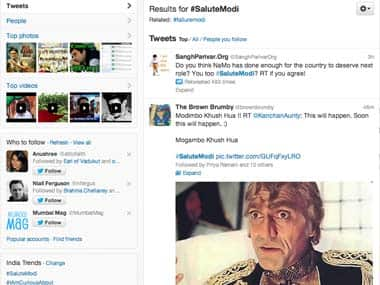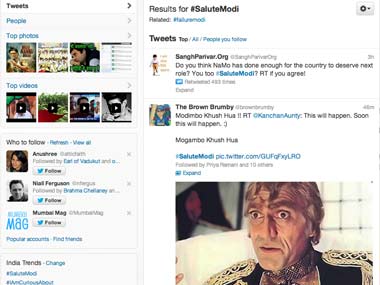If the ’trends’ list on Twitter is a template for the broader interests of the nation, at the time this report was being filed, half of India was busy making Modi sound like Edmund Hillary and saluting him as the rest had to choose between the Gutsy Maybelline Girl , Taliban and James Gandolfini to remain occupied. Twitter ’trends’ serve two purposes apart from making you feel extremely proud of your multicultural nation’s list of intellectual interests. One, if you are an aspiring Twitter celebrity or a stand-up comic, it directs you to the conversations you should jump into to further your virtual ambitions. Second, it gives you a fair idea about the political loyalties of the country’s Internet users and what political direction the social media winds are blowing. Twitter is where playing to the galleries is neither a bad, nor an unsuccessful idea. Just a few hours before #SaluteModi started trending on Twitter, another hashtag figured in the trending tags. It was #FailureModi. It is not too difficult to figure out that #SaluteModi came up in retaliation to #FailureModi. Sagnik Dutta, in his cover story on Frontline , explores the phenomenon and reveals the workings of social media campaigners for political parties. The article notes:
However, a careful study of Modi’s use of social media brings out a focussed and, to an extent, orchestrated attempt at projecting him as a masculine, aggressive and unstoppable achiever, one who has decidedly embarked on the path of attaining the position of Prime Minister in 2014. An elaborate machinery is at work to bring this to fruition. According to Modi’s political opponents, the online campaign is often characterised by exaggerations and false claims. A noticeable feature of this campaign, especially in social media fora such as Twitter, is the intolerance shown towards any tweeter who tries to counter the claims made about Modi, displaying the very same characteristics of machismo and force that constituted the backbone of Hindu nationalism in its heyday.
[caption id=“attachment_891687” align=“alignleft” width=“380”]
 Screenshot of the #saluteModi hashtag page[/caption] A focused political campaign on social media, therefore, is now as important as buoyant speeches at election rallies. And the biggest proof of the same are hashtag wars on Twitter. A
study cited in a Wall Street Journa
_l_ article suggested that the outcome of 16o out of 543 seats in the Lok Sabha could be influenced by social media campaigns. Given that a majority in the Parliament is achieved by bagging 272 seats, that is a significant trend. The suggestion, however, was based on the fact that 10 percent of the voters in these constituencies use Facebook. However, one has to consider the fact that interest in the Internet is not directly related to interest in politics. Also, interest in political discussion on the internet doesn’t necessarily translate into votes. Complacence towards voting, especially among young urban Indians, is a malady the country’s political infrastructure has been dealing with for a long time now. Also, a
Google search reveals
that just 10.1 percent of India’s population had access to internet in 2011. A number that probably points to the fact that what fascinates the internet population might not be what fascinates the entire country. Ruchi Gupta explains in an article on The Hindu:
Screenshot of the #saluteModi hashtag page[/caption] A focused political campaign on social media, therefore, is now as important as buoyant speeches at election rallies. And the biggest proof of the same are hashtag wars on Twitter. A
study cited in a Wall Street Journa
_l_ article suggested that the outcome of 16o out of 543 seats in the Lok Sabha could be influenced by social media campaigns. Given that a majority in the Parliament is achieved by bagging 272 seats, that is a significant trend. The suggestion, however, was based on the fact that 10 percent of the voters in these constituencies use Facebook. However, one has to consider the fact that interest in the Internet is not directly related to interest in politics. Also, interest in political discussion on the internet doesn’t necessarily translate into votes. Complacence towards voting, especially among young urban Indians, is a malady the country’s political infrastructure has been dealing with for a long time now. Also, a
Google search reveals
that just 10.1 percent of India’s population had access to internet in 2011. A number that probably points to the fact that what fascinates the internet population might not be what fascinates the entire country. Ruchi Gupta explains in an article on The Hindu:
Voter turnout in India in the general election is around 60 per cent, with greater participation of the lower income classes. It is thus safe to assume that the percentage of politically active users on social media will be less than 60 per cent given their middle-class base.
So, what does the hash tag war essentially achieve, apart from making Twitter as entertaining as eavesdropping on neighbours fighting over parking space? It doesn’t promote dialogue, given how prone to verbal violence several Twitter users are. What it does is probably serve as a platform for ideas to be bounced off. While two parties cry themselves hoarse over a subject, a bystander profits the most. He is served several sides of the story on a platter and if he chooses to, he might resort to forming a political opinion based on that. Also, politics and winning/losing elections is as much about ownership of physical territories as psychological. The Twitter wars might be a virtual extension of the same. Where, like in real life, it is important to draw battle lines and let the enemy know you’re watching them. Tweets, retweets, followers and trends - at the end of the day the statistics, in the virtual world, is the ammunition you use to intimidate or trounce the opposition. So for every #Pappu trending tag there will be a #Feku and at day end tweet statistics will predict who won in that particular battle of statement-making.
)